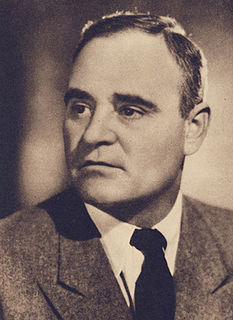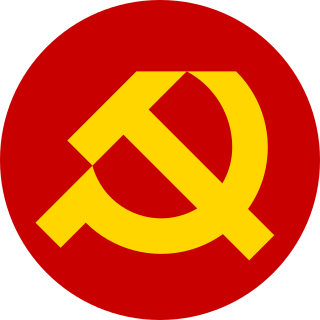
Constitutional Assembly elections were held in Bulgaria on 27 October 1946. The elections served to elect members to the 6th Grand National Assembly, tasked with adopting a new constitution. The Fatherland Front, an anti-fascist coalition dominated by the Bulgarian Communist Party, had come to power in 1944 following a coup. Now that the Second World War was over and the monarchy abolished the communists wanted to adopt a new constitution. The Communists won a large majority, with 53.5 percent of the vote and 278 of the 465 seats. Voter turnout was 92.6%. This would be the lowest vote share that the Communists or the Fatherland Front would claim during the 43 years of undisguised Communist rule in Bulgaria. In subsequent years, the Fatherland Front would claim to win elections with unanimous or near-unanimous support.
Elections to the Supreme Soviet were held in the Soviet Union on 12 March 1950.

Parliamentary elections were held in Bulgaria on 8 June 1986. The Fatherland Front, dominated by the Bulgarian Communist Party, was the only organisation to contest the election; all candidate lists had to be approved by the Front. The Front nominated one candidate for each constituency. Of the 400 candidates 276 were members of the Communist Party, 99 were members of the Bulgarian Agrarian National Union and the remaining 25 were unaffiliated. Voter turnout was reportedly 99.5%.

Parliamentary elections were held in Bulgaria on 7 June 1981. The Fatherland Front, dominated by the Bulgarian Communist Party, was the only organisation to contest the election; all candidate lists had to be approved by the Front. The Front nominated one candidate for each constituency. Of the 400 candidates 271 were members of the Communist Party, 99 were members of the Bulgarian Agrarian National Union and the remaining 30 were unaffiliated. Voter turnout was reportedly 99.9%.

Parliamentary elections were held in Bulgaria on 30 May 1976. The Fatherland Front, dominated by the Bulgarian Communist Party, was the only organisation to contest the election; all candidate lists had to be approved by the Front. The Front nominated one candidate for each constituency. Of the 400 candidates 272 were members of the Communist Party, 100 were members of the Bulgarian Agrarian National Union and the remaining 28 were unaffiliated. Voter turnout was reportedly 99.9%.

Parliamentary elections were held in Bulgaria on 27 June 1971, the first held under the new Zhivkov Constitution, which had been approved in a referendum held a month earlier. The Fatherland Front, dominated by the Bulgarian Communist Party, was the only organisation to contest the election; all candidate lists had to be approved by the Front. The Front nominated one candidate for each constituency. Of the 400 candidates 268 were members of the Communist Party, 100 were members of the Bulgarian Agrarian National Union and the remaining 32 were unaffiliated. Voter turnout was reportedly 99.9%.

Parliamentary elections were held in Bulgaria on 18 December 1949. They were the first legislative elections held under undisguised Communist rule. With all meaningful opposition having been destroyed, voters were presented with a single list from the Fatherland Front, dominated by the Bulgarian Communist Party. According to official figures, almost 4.7 million people turned out to vote and only 980 of them voted against the list, while another 109,963 ballots were invalid or blank. Voter turnout was reportedly 98.9 percent.

Parliamentary elections were held in Bulgaria on 20 December 1953. Voters were presented with a single list from the Fatherland Front, dominated by the Bulgarian Communist Party. As the Fatherland Front was the only organisation to contest the election and all candidate lists had to be approved by the Front, voters only had the option of voting for or against the Front list. Only 0.2% of vote were cast against the Front. Voter turnout was reportedly 99.5%.

Parliamentary elections were held in Bulgaria on 22 December 1957. Voters were presented with a single list from the Fatherland Front, dominated by the Bulgarian Communist Party. As the Fatherland Front was the only organisation to contest the election and all candidate lists had to be approved by the Front, voters only had the option of voting for or against the Front list. Only 2,076 of the 5,206,103 valid votes were cast against. Voter turnout was reportedly 99.8%.

Parliamentary elections were held in Bulgaria on 27 February 1966. Voters were presented with a single list from the Fatherland Front, dominated by the Bulgarian Communist Party. As the Fatherland Front was the only organisation to contest the election and all candidate lists had to be approved by the Front, voters only had the option of voting for or against the Front list. Only 2,089 of the 5,746,161 valid votes were cast against the Front list. Voter turnout was reportedly 99.6%.

Parliamentary elections were held in Hungary on 28 and 29 May 1939. The result was a victory for the Party of Hungarian Life, which won 181 of the 260 seats in Parliament. Pál Teleki remained Prime Minister. It won 72 percent of the parliament's seats and won 49 percent of the popular vote in the election. This was a major breakthrough for the far-right in Hungary.

General elections were held in Romania in June 1939. The Chamber of Deputies was elected on 1 June, whilst the Senate was elected a day later. They were the first since the introduction of the royal dictatorship of King Carol II under the 1938 constitution. Voters were presented with a single list from the National Renaissance Front, which had been the only legally permitted party in Romania since December.

Parliamentary elections were held in Romania on 30 November 1952. They were the second held under undisguised Communist rule, and the first under a constitution adopted that September. Voters were presented with a single slate of candidates from the People's Democratic Front, which was dominated by the Romanian Workers Party. The Front won all 428 seats in the Great National Assembly. This election set the tone for all elections held in Romania until 1989. For the remainder of the Communist era, voters only had the choice of approving or rejecting a Communist-dominated list.

Parliamentary elections were held in Romania on 3 February 1957. Voters were presented with a single slate of candidates from the People's Democratic Front, which was dominated by the Romanian Workers Party. The Front won all 437 seats in the Great National Assembly.

Parliamentary elections were held in Romania on 5 March 1961. Voters were presented with a single list from the People's Democratic Front, which was dominated by the Romanian Workers Party. The Front won all 465 seats in the Great National Assembly.

Parliamentary elections were held in Romania on 7 March 1965. Voters were presented with a single list from the People's Democratic Front, which was dominated by the Romanian Workers Party. The Front won 465 seats in the Great National Assembly.

Parliamentary elections were held in Romania on 2 March 1969. The Front of Socialist Unity, which had been formed a year earlier to replace the People's Democratic Front, was the only organization that contested the election; no prospective candidate could run for office without the Front's approval. Like the People's Democratic Front, the Front of Socialist Unity was dominated by the Romanian Communist Party. The Front won all 465 seats in the Great National Assembly.

Parliamentary elections were held in Romania on 9 March 1975. The Front of Socialist Unity, dominated by the Romanian Communist Party and including other mass organisations, was the only organisation that contested the election. No prospective candidate could run for office without the Front's approval. The Front won all 349 seats in the Great National Assembly.

Parliamentary elections were held in Romania on 9 March 1980. The Front of Socialist Unity and Democracy, dominated by the Romanian Communist Party and including other mass organisations, was the only organisation that contested the election. No prospective candidate could run for office without the Front's approval. The Front won all 369 seats in the Great National Assembly.

Parliamentary elections were held in Romania on 17 March 1985. The Front of Socialist Unity, dominated by the Romanian Communist Party and including other mass organisations, was the only organisation that contested the election. No prospective candidate could run for office without the Front's approval. The Front won all 369 seats in the Great National Assembly. These would be the last single-party elections held in Romania; the Communists would be overthrown four years later.









